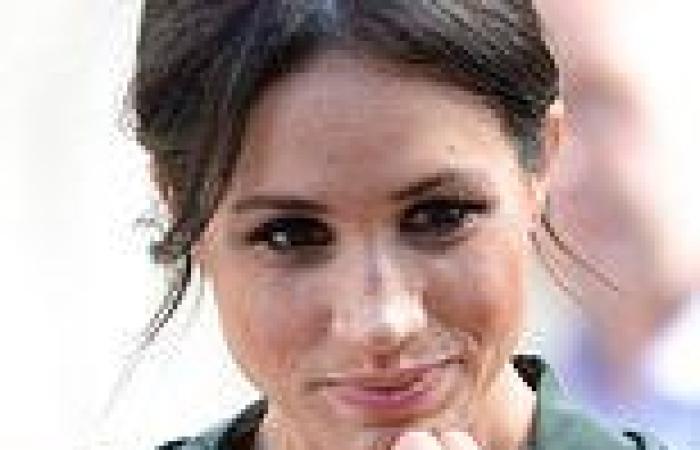Legal experts warned of a chilling effect on freedom of speech yesterday after appeal judges ruled in favour of the Duchess of Sussex in a privacy dispute with a newspaper.
The Court of Appeal upheld a High Court decision that Meghan had a 'reasonable expectation of privacy' over a letter written to her estranged American father, Thomas Markle.
The judges threw out an appeal by The Mail on Sunday and said that an 'unfortunate lapse of memory' by the duchess that led to her apologising to the court did not affect the decision.
During a lengthy legal battle, the newspaper has defended its right to publish extracts of the correspondence in February 2019.
Meghan, 40, yesterday used the court victory to launch an attack on the Press, saying the judgment should lead to a 'reshape' of the 'tabloid industry'.
But lawyers and media experts said the decision had set a 'dangerous precedent' by extending the right of privacy to benefit the 'rich and powerful'.

The Court of Appeal upheld a High Court decision that Meghan Markle (picutred) had a 'reasonable expectation of privacy' over a letter written to her estranged father Thomas
Matthew Dando, a partner at law firm Wiggin, said the judgment raised 'very concerning consequences for freedom of expression'.
He said: 'By preventing key evidence being heard regarding the preparation of the duchess's letter and its intended audience, the Court of Appeal has presumptively elevated the duchess's privacy rights over matters of public interest and freedom of expression.
'This decision heightens concerns that privacy laws permit public figures selectively to determine what can be reported about them and manipulate the media narrative.
'It also sets a dangerous precedent that anyone arguing against that status quo may not even be entitled properly to test the claimant's evidence in court.'
Mark Stephens, a media law expert and partner at law firm Howard Kennedy, said the court appeared to have 'shifted the boundaries' as to what is a reasonable expectation of privacy.
He said: 'Their ruling suggests it doesn't matter whether she intends or doesn't to put information in the public domain, she has a right to privacy irrespective.
'Essentially that leads us to a point where the rich and powerful are able to have their PR firm put forward a primped and preened image where it is incredibly difficult for news organisations to put forward an unvarnished, alternative narrative.'
He added: 'There is a good, solid argument that the Mail on Sunday had a right to at least have a trial to have disclosure, to cross-examine witnesses and also for Meghan to do the same and test the evidence. She has now had the right to portray herself in this way without a trial.'
David Yelland, a former editor of The Sun newspaper who now runs communications company Kitchen Table Partners, described Meghan's attack on the Press as 'extraordinary'.
'There will be powerful people who have looked at this judgment and will be delighted,' he said.
'There is no doubt privacy in the last ten years has gone the way of the powerful.'

Judges threw out an appeal by The Mail on Sunday and said an 'unfortunate lapse of memory' by the duchess (pictured with Harry) that led to her apologising did not affect the decision
The case was discussed in the House of Commons yesterday after Scottish Nationalist MP Martin Docherty-Hughes asked Jacob Rees-Mogg, Leader of the House, if he would congratulate the duchess.
Mr Rees-Mogg replied: 'It is concerning that the rich and powerful can use the court to protect their private life when others can't. I would be deeply concerned about anything that undermines freedom of speech.'
Tory MP John Whittingdale, the former culture secretary and ex-chairman of the culture select committee, said: 'That the courts are interpreting the law to extend the right to privacy without parliament properly considering what should happen is a matter of great concern. This has been a concern for a long time.'
The duchess launched her case against The Mail on Sunday after claiming that the 'personal and private' handwritten note she sent her father after her 2018 wedding to Prince Harry should have remained confidential.
She claimed that publishing parts of it had also infringed her copyright. The Mail on Sunday, the Daily Mail's sister paper, had challenged an earlier High Court ruling by Lord Justice Warby which handed victory to Meghan in a 'summary judgment' in February without a trial being held.
But Court of Appeal judges Sir Geoffrey Vos, Dame Victoria Sharp and Lord Justice Bean upheld the decision yesterday. They said the contents of Meghan's letter were 'personal, private and not matters of legitimate public interest'.
Associated Newspapers, which publishes The Mail on Sunday, said it was considering appealing the decision at the Supreme Court.
It had argued that Meghan wrote the letter knowing it was likely to enter the public arena, pointing out that details were subsequently leaked to the authors of a gushing biography of the Sussexes called Finding Freedom.
The Mail on Sunday said its articles gave Mr Markle a right of reply to damaging and false claims that had been made about him when information about the letter was earlier briefed to People magazine in the US by Meghan's friends.
The magazine first revealed the existence of the letter publicly in a way favourable to Meghan and which accused Mr Markle of 'cruelly cold-shouldering' her before her wedding.
Lawyers for Associated Newspapers argued that the People article misrepresented the note the duchess sent to her father as a loving letter and an attempt at reconciliation when it was no such thing.






